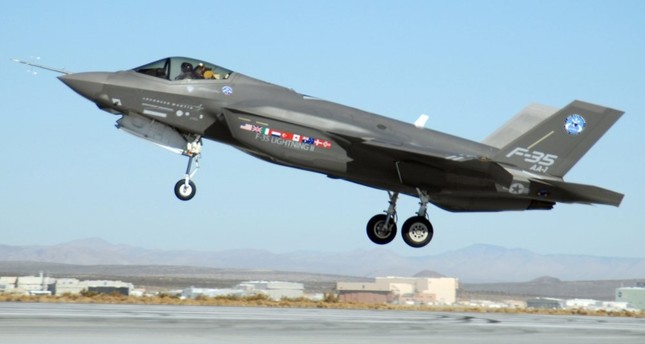During a press conference in Ankara on Friday, Foreign Affairs Ministry spokesperson Hami Aksoy said that Turkey has “fulfilled all requirements” of the multinational Joint Strike Fighter Program to produce Lockheed Martin’s F-35 Lightning II. Aksoy underscored that the multinational program contract assigns specific responsibilities to all involved parties and Turkey expects the U.S. to fulfill all contractual responsibilities.
“Such steps are contrary to the spirit of alliance we have with the U.S.,” Aksoy said. Referring to Foreign Affairs Minister Mevlüt Çavuşoğlu’s remarks on the subject, Aksoy added that Turkey would have to retaliate if U.S. acts in contravention to the F-35 program requirements.
A U.S. Senate committee passed on Thursday a defense policy bill in which measures to prevent Turkey from purchasing the F-35 jets were included.
The amendment to the National Defense Authorization Act, or NDAA, from Democratic Senator Jeanne Shaheen and Republican Senator Thom Tillis, would remove Turkey from the F-35 program over the country’s detention of U.S. citizen Andrew Brunson, Shaheen’s office said. The bill also cites Turkey’s agreement with Russia to buy S-400 surface-to-air missile batteries.
In responding to the U.S. Senate bill, Aksoy also said the latest U.S. move targeted Turkey to persuade it to drop its S-400 defense system deal with Russia and release American pastor Andrew Brunson, who is held in Turkey on terror charges for his links to the PKK and the Gülenist Terror Group (FETÖ).
U.S. Secretary of State Mike Pompeo said on Wednesday on Capitol Hill that he has not made a decision on the delivery of F-35 warplanes to Turkey.
Upon Pompeo’s remarks, a Turkish official told Daily Sabah that joint productions with the U.S. and other countries are not subject to congressional overview and are not required to go through a U.S. State Department direct sale process, which would require the secretary of state’s approval.
One Washington expert speculated that there was a chance that Pompeo was commenting on the issue without being fully briefed about the technicalities. The Turkish official, who spoke on condition of anonymity due to government protocol, said the U.S. could only kick Turkey out of the consortium by getting approval from the remaining seven nations: Australia, Canada, Denmark, Italy, the Netherlands, the U.K. and Norway.
As speculation looms over the purchase of the Lockheed Martin F-35 Lightning II fighter jets, it is significant to take a brief look at the case from the Turkish side.
The Undersecretariat for Defense Industries (SSM) plans to supply 100 F-35A aircraft to the Turkish Air Force Command as part of the Joint Offensive Aircraft (F-35) Project, which Turkey joined as a partner country, to meet the needs of the Air Force Command’s next generation warplane.
The Defense Industry Executive Committee made a procurement decision for the first 30 aircraft, and delivery of the first F-35 fighter jet is scheduled for June 21 with a ceremony at the Lockheed Martin’s Fort Worth facilities. The first two fighter jets will be deployed to Luke Air Force Base in the United States by the end of 2020 to train Turkish pilots.
After training the pilots and delivering the fighter jets to Turkey, the aircraft will be deployed to the Malatya 7th Main Jet Base Command by November 2019. Work to modernize Malatya Air Base to meet the aircraft’s needs should be finished by the end of this year.
Turkey’s domestic industry has played a substantial role in the Joint Offensive Aircraft Project, and these participating firms are expected to make a profit of $12 billion. For instance, Alp Aviation helped produce bodywork and landing gear, while defense giant ASELSAN developed electronic optical targeting systems and air intervention controls.
Ayesaş supplied the missile remote control interface and panoramic cockpit imaging system, and Fokker Elma produced electrical cabling and internal connection systems. Havelsan provided the training systems for F-35 jets, while Kale Aviation produced the body structure, connections and landing gear locking systems.
Defense giant ROKETSAN TÜBİTAK SAGE developed the SOM-J standoff missiles to be transported by the F-35s; Turkish Aerospace Industries (TAI) manufactured production materials, body coatings and provided the integration of air to ground systems; Turkish defense firm MİKES also helped produce various parts.Turkey’s cooperation with prime contractor Lockheed Martin dates back to the 1990s when it purchased F-16 fighter jets.
The first next-generation F-35A fighter jet produced for Turkey made its maiden flight at the U.S. weapons manufacturer Lockheed Martin facilities in Fort Worth, Texas on Tuesday.
Source:dailysabah.com

